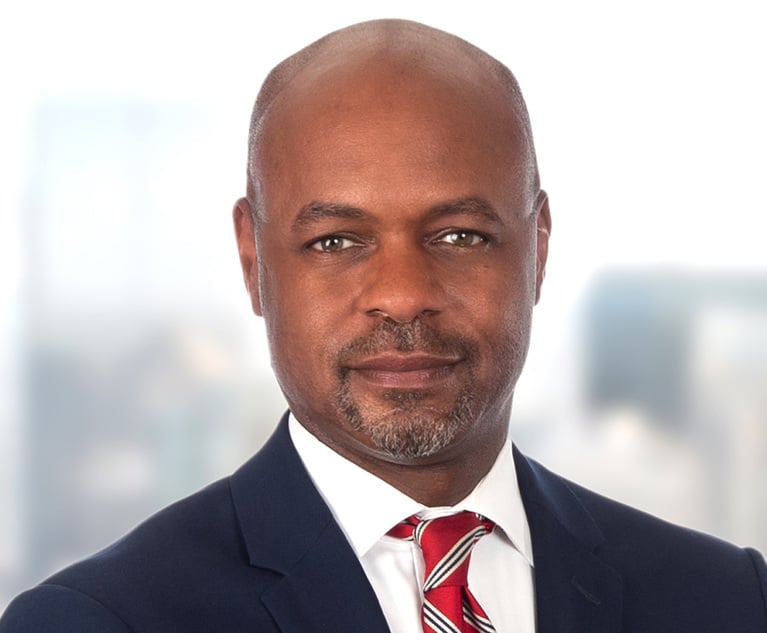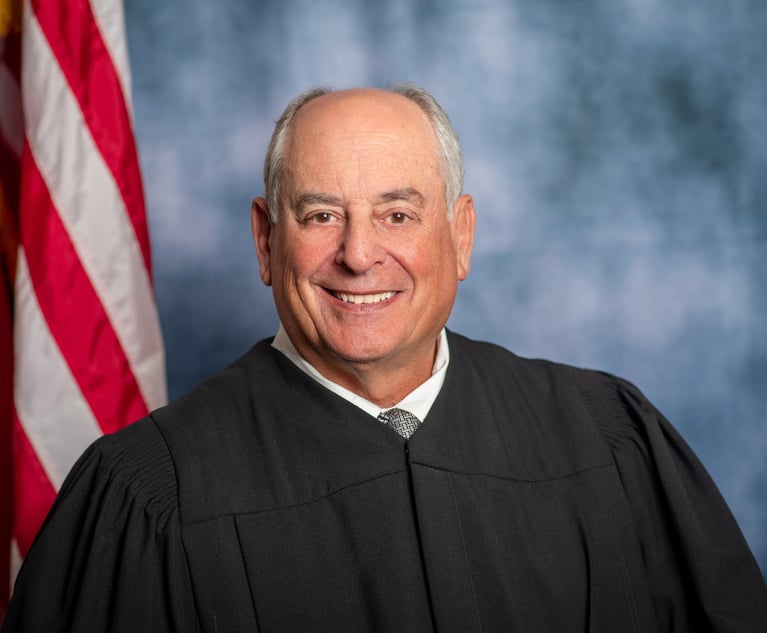 Judge Lisa Branch, U.S. Court of Appeals for the Eleventh Circuit. (Photo: Diego M. Radzinschi/ALM)
Judge Lisa Branch, U.S. Court of Appeals for the Eleventh Circuit. (Photo: Diego M. Radzinschi/ALM)LaGrange Plans to Fight Revived Fair Housing Lawsuit Over Utilities
"While disappointed in the panel's ruling on this preliminary issue, we also note that the court only ruled on one of the three grounds of the City's original motion to dismiss," LaGrange city attorney Jeffrey Todd of Lewis, Taylor & Todd said, "We recognize this could well be protracted litigation."
October 15, 2019 at 03:28 PM
5 minute read
The city of LaGrange plans to keep fighting a civil rights lawsuit alleging discriminatory practices that deprive those in poverty—particularly African Americans and Latinos—of electricity, gas and water.
The U.S. Court of Appeals for the Eleventh Circuit revived the litigation with a ruling last week vacating Northern District of Georgia Judge Timothy Batten's dismissal of the complaint.
"While disappointed in the panel's ruling on this preliminary issue, we also note that the court only ruled on one of the three grounds of the City's original motion to dismiss," LaGrange city attorney Jeffrey Todd of Lewis, Taylor & Todd said. "Moreover, the court specifically referenced the authority of the District Court to consider the other defenses of our initial motion."
Todd expressed "strong confidence in our ability to fight the merits of the individual claims on the facts." Plus, he said he will renew the argument that § 3604(b) of the Fair Housing Act "does not allow the disparate impact claims filed by the plaintiffs, and that plaintiffs have not and cannot meet the heightened burden for such claims as established by the United States Supreme Court in Inclusive Communities."
"We recognize this could well be protracted litigation, and look forward to arguing our remaining defenses and, if necessary, the merits of the claims in the District Court," Todd said.
Judge Elizabeth Branch of the U.S. Court of Appeals for the Eleventh Circuit said in a footnote at the end of the 13-page opinion that the ruling "in no way forecloses the district court on remand from reevaluating the standing of the plaintiffs or from considering any other affirmative defenses asserted."
But Branch came down strongly in defense of utilities being essential services required for fairness in housing.
"We conclude that because the water, gas, and electricity services at issue in this case are essential to the habitability of a dwelling and closely connected with the sale or rental of housing, they unambiguously fall within the scope of §3604(b)," Branch said, writing for a panel that included Eleventh Circuit Judge Charles Wilson and Senior Judge Roger Vinson of the Northern District of Florida.
"Our opinion is limited solely to the determinations that § 3604(b) encompasses some post-acquisition conduct and that the basic utility services in question here fall within the scope of services covered by § 3604(b)," Branch said. "Accordingly, the district court's opinion to the contrary is hereby vacated, and the case is remanded for further proceedings consistent with this opinion. On remand, the district court should determine anew whether the plaintiffs' disparate impact allegations have stated a claim upon which relief may be granted under § 3604(b).
In May 2017, the Southern Center for Human Rights, the National Immigration Law Center, and Relman, Dane & Colfax filed the lawsuit against the city of LaGrange, alleging that the city's utility policies violated the Fair Housing Act. The federal court dismissed the lawsuit in December 2017.
The city of LaGrange is the sole provider of electricity, gas and water utility services. Unlike most municipalities in the country, LaGrange does not levy property taxes—a policy decision that the city routinely touts to recruit new employers and residents. Instead, municipal operations are largely funded through the city's sale of basic utilities to its residents, according to the complaint.
The city requires that utility customers comply with two policies in order to initiate and maintain those basic utility services: First, both applicants and current customers must pay any debts they owe to the city, including unrelated municipal court fees and fines, to maintain their utilities. Under a city ordinance, residents with municipal court debt cannot obtain electricity, gas or water, and current customers who owe court debt to the city may have their utilities turned off, sometimes with little advance notice. Second, the city requires an applicant seeking to open a new utility account to present a valid state- or federally-issued photo ID, which many Latinx residents in LaGrange are categorically ineligible to obtain, according to the complaint.
The plaintiffs allege a disproportionate impact of these policies on minority communities. The complaint said 90% of the residents subjected to the court debt policy were African Americans, who make up only 48% of the population; or Latinx immigrants, who are overwhelmingly impacted by the city's policy of requiring photo identification in order to obtain utilities.
"The Court's order could not have been more clear—housing discrimination is unlawful regardless of whether it occurs before or after someone moves into their home," Atteeyah Hollie, senior attorney with the Southern Center for Human Rights, said in a news release. "This is a win for everyone committed to achieving fair housing practices in Georgia and beyond."
Mayra Joachin, staff attorney at the National Immigration Law Center, called the Branch opinion "a tremendous victory for the Black and Latinx communities in LaGrange that have suffered because of the city's discriminatory utility policies."
Joachin added, "Everyone, regardless of their nationality or socioeconomic status, should be able to access gas, water and electricity. Policies like these are regressive and often hurt immigrant and low-income communities of color the most. Today, the court reminded us that policies affecting access to essential utilities are protected from discrimination under the Fair Housing Act and we're encouraged to see such a clear decision."
This content has been archived. It is available through our partners, LexisNexis® and Bloomberg Law.
To view this content, please continue to their sites.
Not a Lexis Subscriber?
Subscribe Now
Not a Bloomberg Law Subscriber?
Subscribe Now
NOT FOR REPRINT
© 2024 ALM Global, LLC, All Rights Reserved. Request academic re-use from www.copyright.com. All other uses, submit a request to [email protected]. For more information visit Asset & Logo Licensing.
You Might Like
View All
Georgia Supreme Court Honoring Troutman Pepper Partner, Former Chief Justice
2 minute read
'A 58-Year-Old Engine That Needs an Overhaul': Judge Wants Traffic Law Amended
3 minute read
Appeals Court Removes Fulton DA From Georgia Election Case Against Trump, Others
6 minute read
Family of 'Cop City' Activist Killed by Ga. Troopers Files Federal Lawsuit
5 minute readTrending Stories
- 1Data Breach Lawsuit Against Byte Federal Among 1,500 Targeting Companies in 2024
- 2Counterfeiters Ride Surge in Tabletop Games’ Popularity, Challenging IP Owners to Keep Up
- 3Health Care Data Breach Class Actions Saw December Surge in NY Courts
- 4Florida Supreme Court Disbars 3, Suspends 11, Reprimands 1 in Final Disciplinary Order of 2024
- 5Chief Justice Roberts Ends Year With Defense Against 'Illegitimate' Attacks on Judiciary
Who Got The Work
Michael G. Bongiorno, Andrew Scott Dulberg and Elizabeth E. Driscoll from Wilmer Cutler Pickering Hale and Dorr have stepped in to represent Symbotic Inc., an A.I.-enabled technology platform that focuses on increasing supply chain efficiency, and other defendants in a pending shareholder derivative lawsuit. The case, filed Oct. 2 in Massachusetts District Court by the Brown Law Firm on behalf of Stephen Austen, accuses certain officers and directors of misleading investors in regard to Symbotic's potential for margin growth by failing to disclose that the company was not equipped to timely deploy its systems or manage expenses through project delays. The case, assigned to U.S. District Judge Nathaniel M. Gorton, is 1:24-cv-12522, Austen v. Cohen et al.
Who Got The Work
Edmund Polubinski and Marie Killmond of Davis Polk & Wardwell have entered appearances for data platform software development company MongoDB and other defendants in a pending shareholder derivative lawsuit. The action, filed Oct. 7 in New York Southern District Court by the Brown Law Firm, accuses the company's directors and/or officers of falsely expressing confidence in the company’s restructuring of its sales incentive plan and downplaying the severity of decreases in its upfront commitments. The case is 1:24-cv-07594, Roy v. Ittycheria et al.
Who Got The Work
Amy O. Bruchs and Kurt F. Ellison of Michael Best & Friedrich have entered appearances for Epic Systems Corp. in a pending employment discrimination lawsuit. The suit was filed Sept. 7 in Wisconsin Western District Court by Levine Eisberner LLC and Siri & Glimstad on behalf of a project manager who claims that he was wrongfully terminated after applying for a religious exemption to the defendant's COVID-19 vaccine mandate. The case, assigned to U.S. Magistrate Judge Anita Marie Boor, is 3:24-cv-00630, Secker, Nathan v. Epic Systems Corporation.
Who Got The Work
David X. Sullivan, Thomas J. Finn and Gregory A. Hall from McCarter & English have entered appearances for Sunrun Installation Services in a pending civil rights lawsuit. The complaint was filed Sept. 4 in Connecticut District Court by attorney Robert M. Berke on behalf of former employee George Edward Steins, who was arrested and charged with employing an unregistered home improvement salesperson. The complaint alleges that had Sunrun informed the Connecticut Department of Consumer Protection that the plaintiff's employment had ended in 2017 and that he no longer held Sunrun's home improvement contractor license, he would not have been hit with charges, which were dismissed in May 2024. The case, assigned to U.S. District Judge Jeffrey A. Meyer, is 3:24-cv-01423, Steins v. Sunrun, Inc. et al.
Who Got The Work
Greenberg Traurig shareholder Joshua L. Raskin has entered an appearance for boohoo.com UK Ltd. in a pending patent infringement lawsuit. The suit, filed Sept. 3 in Texas Eastern District Court by Rozier Hardt McDonough on behalf of Alto Dynamics, asserts five patents related to an online shopping platform. The case, assigned to U.S. District Judge Rodney Gilstrap, is 2:24-cv-00719, Alto Dynamics, LLC v. boohoo.com UK Limited.
Featured Firms
Law Offices of Gary Martin Hays & Associates, P.C.
(470) 294-1674
Law Offices of Mark E. Salomone
(857) 444-6468
Smith & Hassler
(713) 739-1250






